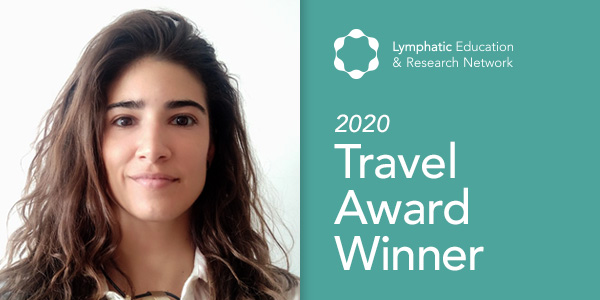Christina Karapouliou, currently a Research Fellow at University College London, UK, completed a Ph.D. at St. George’s University of London under the supervision of Dr. Pia Ostergaard and received a travel award from LE&RN to attend the GRC Conference on Lymphatics. We asked Dr. Karapouliou to share her thoughts on that experience with us and to tell us a bit about her research and future plans.
What did you get out of the Lymphatic Conference? Why did you feel it was important to attend?
I would like to express my gratitude to LE&RN for the Travel Award and for supporting me to attend the 2020 Gordon Conference on Lymphatics. It was my second time attending the GRC Conference and Seminar on Lymphatics and presenting my work as a poster. I like this conference because it is an assembly of leading international scientists and clinicians presenting state-of the-art research on lymphatic vessel biology. My attendance at the GRC provided me a major opportunity to communicate my research findings in the lymphovascular field to scientists in the lymphatic community whereas my discussions with the great experts in the field during the conference stimulated new ideas for research. During the poster presentations, I had the opportunity to develop personal interactions with other researchers, get valuable feedback on my work as well as develop new connections. Moreover, this conference is designed to advance and integrate knowledge not only of lymphatic vascular biology and pathology, but also to stimulate interdisciplinary research. Therefore, it was the premier venue for improving my knowledge about cutting edge methodologies in a wide variety of research areas and enabled me to develop as a scientist and as a researcher.
What are your areas of interest in research?
As a Ph.D. student, my research was focused on deciphering the molecular mechanisms of pathogenesis underlying a type of primary lymphoedema caused by mutations on the EPHB4 gene. I have also investigated the role of the EPHB4 protein in specific stages of the lymphangiogenic process using a loss-of-function model system on lymphatic endothelial cells. My research findings show that the EPHB4 mutations disrupt the molecular signaling pathways that this protein is involved in and indicate a role for EPHB4 as a regulator of lymphatic endothelial cell behavior. These results are an important contribution to our understanding of the role of EPHB4 signaling in the lymphatic system and its association with lymphatic-related diseases.
What are your hopes and plans for your career and your research?
My career aspiration is to conduct research with a strong translational aspect, converting basic science discoveries into clinical applications in order to improve patient health. Therefore, I strive to understand the molecular causes of human genetic disorders with the ultimate goal of taking that knowledge one step further and translating the mechanisms into mechanism-based therapies. I hope that, in the future, I will be able to pursue this aim as a group leader and help to mentor and train a new generation of scientists.
Why do you believe that, in general, lymphatic research is important? What might the field accomplish within the next few years?
Expanding the knowledge of the mechanisms underlying lymphatic pathology holds great promise for developing therapeutic strategies against lymphatic diseases. Moreover, a thorough understanding of the development of lymphatic vasculature and the molecular cues governing its formation and regulation could lead to novel insights into the involvement of lymphatic vessels, not just in lymphatic-related diseases such as lymphedema, but in other pathologies in which they play major roles. Cardiovascular disease, infection and immunity, cancer, and probably obesity are common diseases associated with lymphatic vessel malfunction and these are considered four of the major challenges in healthcare in the 21st century.
LE&RN programs, like LE&RN Travel Awards, are only possible because of our Partners and Supporting Members. Become a Supporting Member today.

